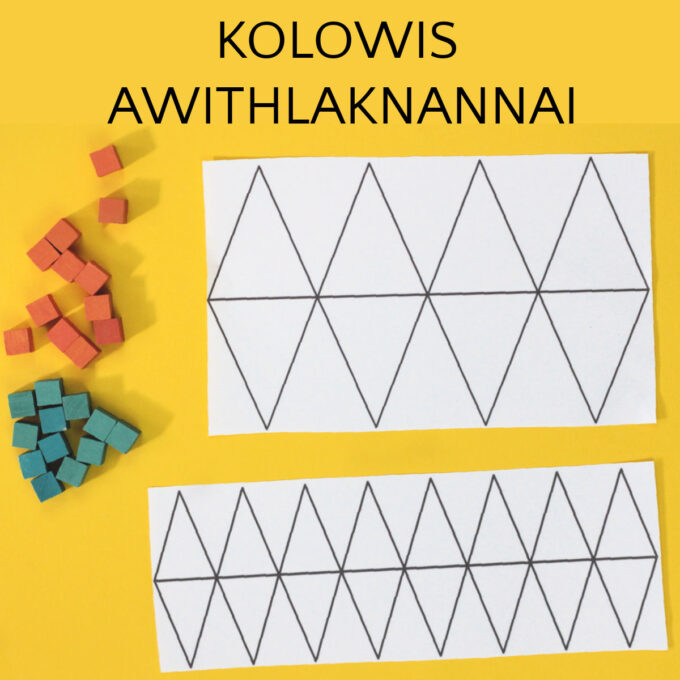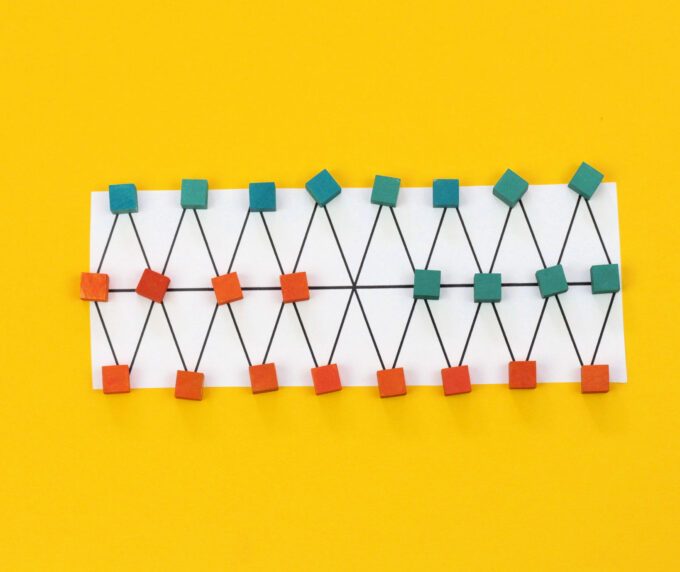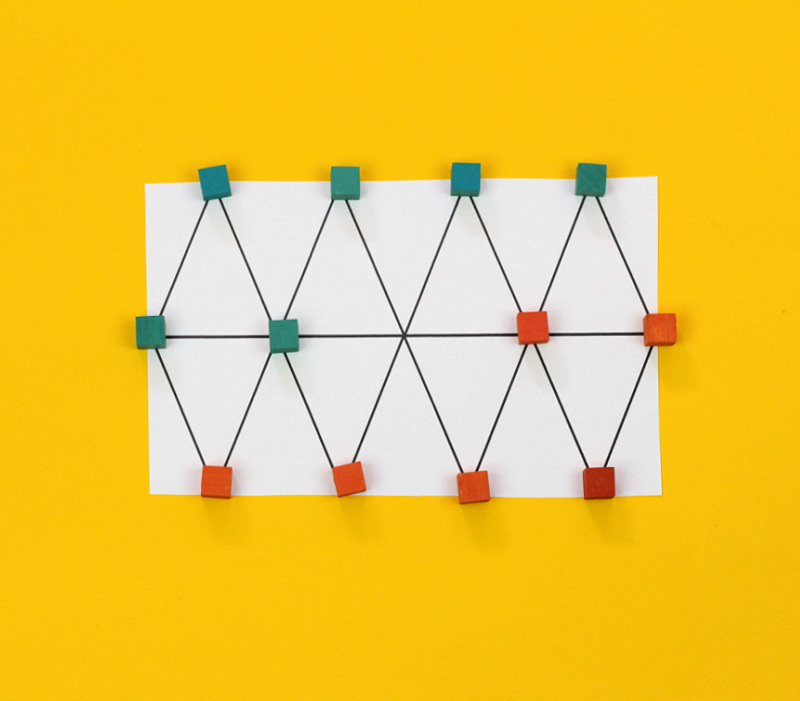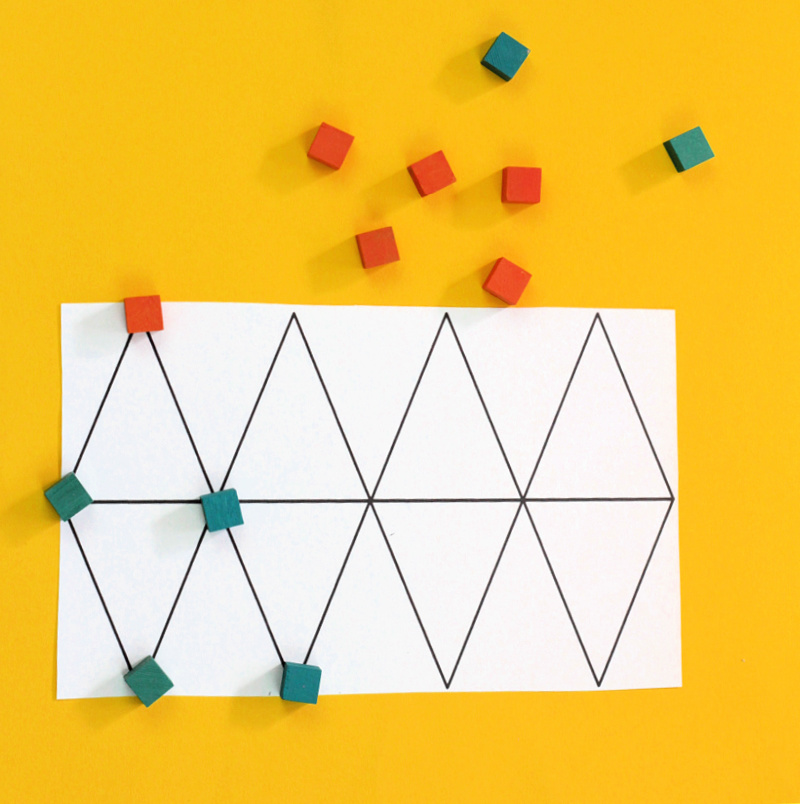Kolowis Awithlaknannai, also known as "Fighting Serpents," is a traditional abstract strategy game from the Zuni people. The Zunis are Native American Pueblo people from the region presently occupied by New Mexico.

The game board consists of pairs of triangles. Traditionally, Kolowis Awithlaknannai is played on a board of 30 pairs of triangles, with 23 tokens per player. We've paired down the game board significantly to make it easier for children, and to shorten the length of the game.
To learn how to play another abstract strategy board game from the Native Americans from the southwest region, try out Picaria, or check out all the traditional games from around the world we've shared with you here.
How to Play Kolowis Awithlaknannai
Objective: To capture or block your opponent.
What you need:
- Game board. See form below to get our free printable, or draw your own. Our printable includes 2 smaller versions. One with 4 pairs of triangles and one with 8 pairs.
- 6 or 12 tokens per player (depending on which board you choose), in 2 different colors
- 2 enthusiastic players
- A crown of victory (optional)
Watch the video instructions and scroll down for the written instructions, tips and history of the game.
Instructions
- Set up the game board
Print out our game board, or draw your own. We suggest starting out with the smaller game board and 6 tokens per player.
Decide who goes first. 4 tokens per player are placed on outside row of points nearest each player. The remaining 2 tokens are placed on the middle row of points, starting with the point to the far right of each player. The middle point will be empty. See photo. - Make the first move!
The first player moves one token to an empty point. At the start of the game, only the middle point is empty.
- Rules
Alternating turns, players move one token to an adjacent empty point according to the following conditions:
Tokens may move in any direction, but may only move along the lines.
Players must jump any available token that can be jumped. This means the second player's first move must be a jump.
Jumped tokens are removed from play.
Multiple jumps with the same token are allowed in a single turn. You may also change direction after making the first jump in order to make the second jump.
If a player fails to make an available jump, their opponent gets to remove that token from play before their next move. If two different jumps were available, but not possible to complete with a single token, no forfeit is made. - Winning
The first player to remove all of their opponent's tokens from play is declared the winner and gets to wear the crown of victory.
Alternatively, if a player is able to prevent their opponent from making a legal move, they win and get to don the crown.
Notes on playing:
If players reach an impasse in play, with no end in sight, they can decide to either 1) call it a draw; or 2) decide that the player with the most tokens remaining is the winner.
Variations:
The beauty of traditional games is they can evolve over time and players can feel free to try out new rules and variations. Here are some ideas to consider:
- Use a smaller or larger board. No matter how long the board is, you need enough tokens so that in the opening position only the center point is empty.
- Do not allow players to change direction when capturing multiple tokens
- Allow captures to be optional instead of compulsory
Boost strategic thinking:
Since Kolowis Awithlaknannai relies on skill and not chance, players have a great opportunity to build upon their strategic thinking skills. Ask these questions:
- Is it better to go first or second?
- Should you ever allow your token to be captured on purpose?
- How can you avoid a draw?
- How does using a different size game board affect game play?
- Is it better to focus on forcing your opponent into the middle of the board or the ends?

History of Kolowis Awithlaknannai
Awithlaknannai comes from the Zuni American Indians. It is part of the Alquerque family of games. A defining characteristic of Alquerque games that pieces can move diagonally and jump to capture enemy tokens, as in checkers.
Games expert and American ethnographer, Stewart Culin, described the game in his 1907 book, Games of the North American Indians Volume 2: Games of Skill. It is believed the Zuni people adapted the game from an Alquerque game introduced by the Spanish Conquistadors.
More of our favorite traditional games:
- Queah - from Liberia
- Picaria from the Zuni
- Watermelon Chess - from China
Further resources on American Indian traditional games:





Tamara Tamiko Porter says
Where is the form to request the template?
Erica says
In the "what you need" section and just before the video, there is a large form with large orange font in all caps that says, "WANT THE PRINTABLE GAME BOARDS?" You'll need to enter your email. If you can't see the form, it is likely due to your browser settings.